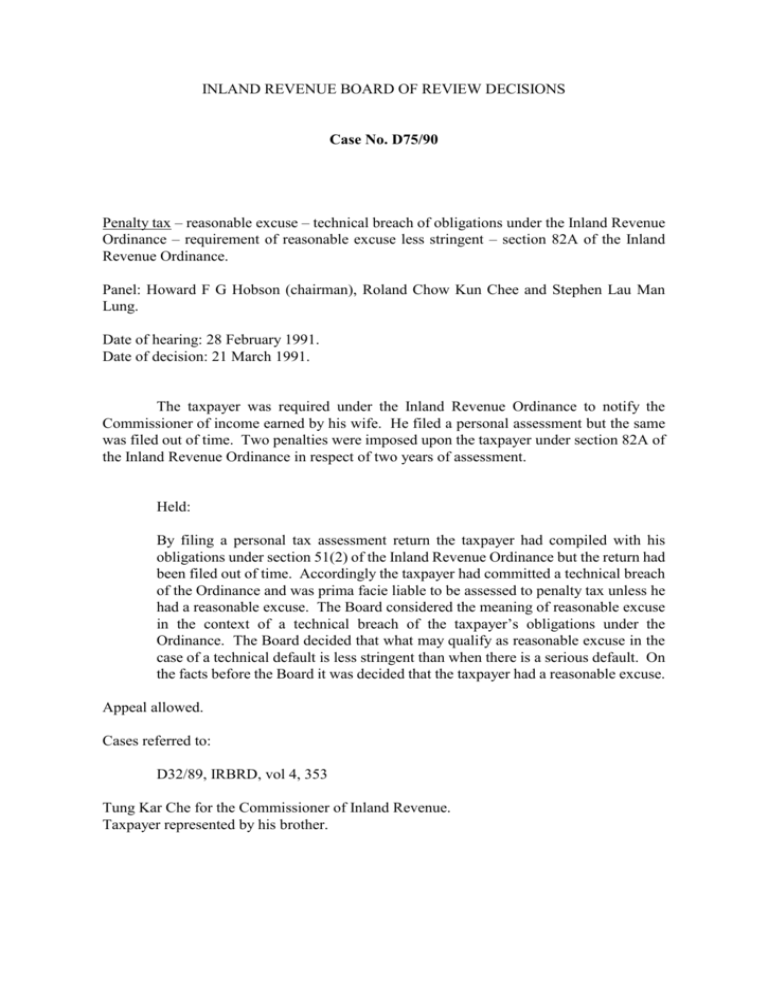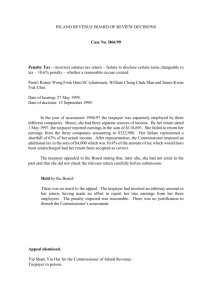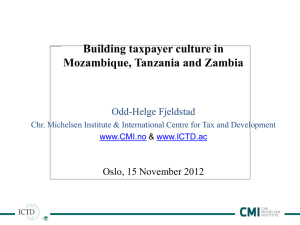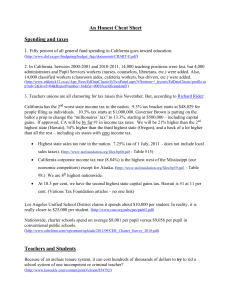Document
advertisement

INLAND REVENUE BOARD OF REVIEW DECISIONS Case No. D75/90 Penalty tax – reasonable excuse – technical breach of obligations under the Inland Revenue Ordinance – requirement of reasonable excuse less stringent – section 82A of the Inland Revenue Ordinance. Panel: Howard F G Hobson (chairman), Roland Chow Kun Chee and Stephen Lau Man Lung. Date of hearing: 28 February 1991. Date of decision: 21 March 1991. The taxpayer was required under the Inland Revenue Ordinance to notify the Commissioner of income earned by his wife. He filed a personal assessment but the same was filed out of time. Two penalties were imposed upon the taxpayer under section 82A of the Inland Revenue Ordinance in respect of two years of assessment. Held: By filing a personal tax assessment return the taxpayer had compiled with his obligations under section 51(2) of the Inland Revenue Ordinance but the return had been filed out of time. Accordingly the taxpayer had committed a technical breach of the Ordinance and was prima facie liable to be assessed to penalty tax unless he had a reasonable excuse. The Board considered the meaning of reasonable excuse in the context of a technical breach of the taxpayer’s obligations under the Ordinance. The Board decided that what may qualify as reasonable excuse in the case of a technical default is less stringent than when there is a serious default. On the facts before the Board it was decided that the taxpayer had a reasonable excuse. Appeal allowed. Cases referred to: D32/89, IRBRD, vol 4, 353 Tung Kar Che for the Commissioner of Inland Revenue. Taxpayer represented by his brother. INLAND REVENUE BOARD OF REVIEW DECISIONS Decision: The Taxpayer has been assessed to additional tax under section 82A of the Inland Revenue Ordinance (‘IRO’) for the years of assessment 1986/87 ($6,600) and 1987/88 ($7,500). We were furnished with some twenty exhibits, including lengthy and explanatory correspondence by the Taxpayer which was clearly intended to be helpful, from which the following facts are drawn: 1. The Taxpayer has carried on business as a taxi driver/owner since 1980 and had filed appropriate profits tax returns. 2.1 Until October 1985 his wife was a partner in a vegetable retail business. On that date the business was, in effect, incorporated in the same name – with the addition of ‘Limited’. Prior to incorporation the wife’s share of profits of the partnership would be received net of tax. From incorporation however she began to draw director’s remuneration and bonuses. 2.2 In consequence of section 51(2) of the IRO the Taxpayer was required to notify the Commissioner in writing of his wife’s income for 1985/86 not later than 31 July 1986. That provision does not however specify the form by which the notification is to be made. Though no penalty tax was imposed for the 1985/86 year of assessment the circumstances for that year are relevant to the subsequent years. 3.1 On 30 December 1986 the Taxpayer filed a 1985/86 personal assessment return showing himself as self-employed and his wife (whose name and identity card number were given) as a 25% ‘partner’ in an unnamed business with an income (in the profits section) for the year of $50,000. 3.2 About 8 December 1988 he filed a personal assessment for 1986/87 again mentioning his wife but this time showing the name of the limited company (but stating she was a ‘partner’ to the extent of one-sixth) and declaring her income as $144,000, again in the profits section. 3.3 On 7 January 1989 he filed a personal assessment return for 1987/88 showing his wife’s income, also in the profits section, as $216,000 for the period concerned. 4.1 About mid-1987 the Inland Revenue Department conducted a review of the partnership and its partners including the Taxpayer’s wife and subsequently wrote to her for various details and sent her reminders. INLAND REVENUE BOARD OF REVIEW DECISIONS 4.2 She eventually replied on 7 June 1989 by filling salaries tax return forms in which she declared her salary for 1985/86 as $72,000, for 1986/87 $144,000 and for 1987/88 $144,000. There is no evidence that the Revenue’s review disclosed any wilful intent to avoid or evade tax. These returns have been accepted by the Inland Revenue Department. 5.1 In March 1989 the Revenue interviewed the Taxpayer. Apparently this was done in ignorance of the review referred to at paragraph 4.1 above. 5.2 On discovering that the Taxpayer’s wife was to person be the returns at paragraph 4.2 above were sent, the Revenue on 31 July 1989 sent the Taxpayer three sets of salaries tax returns for the same three years which he filed on 1 September 1989. The information he gave is the same in each case as that appearing in the wife’ returns. Again there is no suggestion of any intent to avoid or evade tax. 6.1 In the Revenue’s statement of facts it is said that even though the Taxpayer filed personal assessment returns they did not refer to his wife’s salary from the limited company. To this the Taxpayer points out that his personal assessments did disclose his wife’s income (and indeed they do, though not in the appropriate section). His explanation for the discrepancy between the $50,000 referred to at paragraph 3.1 above and the $72,000 referred to at paragraph 4.2 above was that his wife subsequently received an increased bonus of $22,000 which he covered in the returns referred to at paragraph 5.2 above. 6.2 During the hearing, the Commissioner’s representative made it clear that the crux of the grounds for the penalty tax was the Taxpayer’s failure to file a salaries tax return for his wife in due time. 6.3 If we have understood it correctly the Taxpayer’s explanation is a combination of the following. In the first place he was not himself directly involved with his wife’s business affairs and during the partnership she drew her income net of tax and though after incorporation she drew director’s remuneration and bonuses (which he had shown to the best of his knowledge in the personal assessment returns – albeit in the wrong section) it was not until his wife’s company’s accountant pointed it out that he appreciated that she was liable specifically to salaries tax; returns for which he, as a self–employed person, had not had to file. Secondly the Revenue should have drawn the matter to his attention when he filed the 1985/86 personal assessment return or at any time at his interview in March 1989. 7. We think the filing of the personal assessment can be construed as adequate notification for the purposes of section 51(2). There is nevertheless a technical breach in that these were filed out of time. Indeed it seems to us that for 1985/86 and the two following years the Taxpayer, without fully appreciating INLAND REVENUE BOARD OF REVIEW DECISIONS the change in his wife’s tax status and therefore the application (novel for her) of section 51(2), merely waited to receive form the Revenue his profits tax and personal assessment return forms in the usual way. When they were received he filed them up in the same way as he had done previously and filed them within the requisite one month. The question is whether the Taxpayer’s explanation affords a reasonable excuse for the technical breach. The Revenue’s representative pointed out that ignorance of the law is no excuse: in effect the Taxpayer should have known his wife’s changed tax status and informed the Commissioner before 31 July 1987 for 1986/87 and before 31 July 1988 for 1987/88. 8. Conclusion We have conducted a review of previous Board of Review decisions, published and unpublished, relating to the imposition of penalty taxes. The majority are concerned with incorrect returns (section 82A(1)(a)) and failure to respond to return forms (section 82A(1)(d)). D32/89 involves a breach of section 82A(1)(e) but the circumstances of that case are not comparable to the facts of the present case: in particular the default was not technical, it was one of substance since there was a complete failure to notify, not – as here – a notification out of time. We could find no guidance as to what constitutes a ‘ reasonable excuse’ but we apprehend that what may quality as such for a technical default is of a less robust quality than that required for a serious default such as understating, even inadvertently, exigible income. With this in mind and having regard to the fact that the Taxpayer, as is apparent from his lack of appreciation of the distinction between a partnership share and shares in a limited company, is not a sophisticated person and had no problems with returns filed before 1985/86 and disclosed his wife’s income in the personal assessment returns which he filed (which in themselves were in time even though out of time for section 51(2)), we consider in the Taxpayer’s case there was a reasonable excuse. Accordingly we allow the appeal and annul the assessments concerned.







